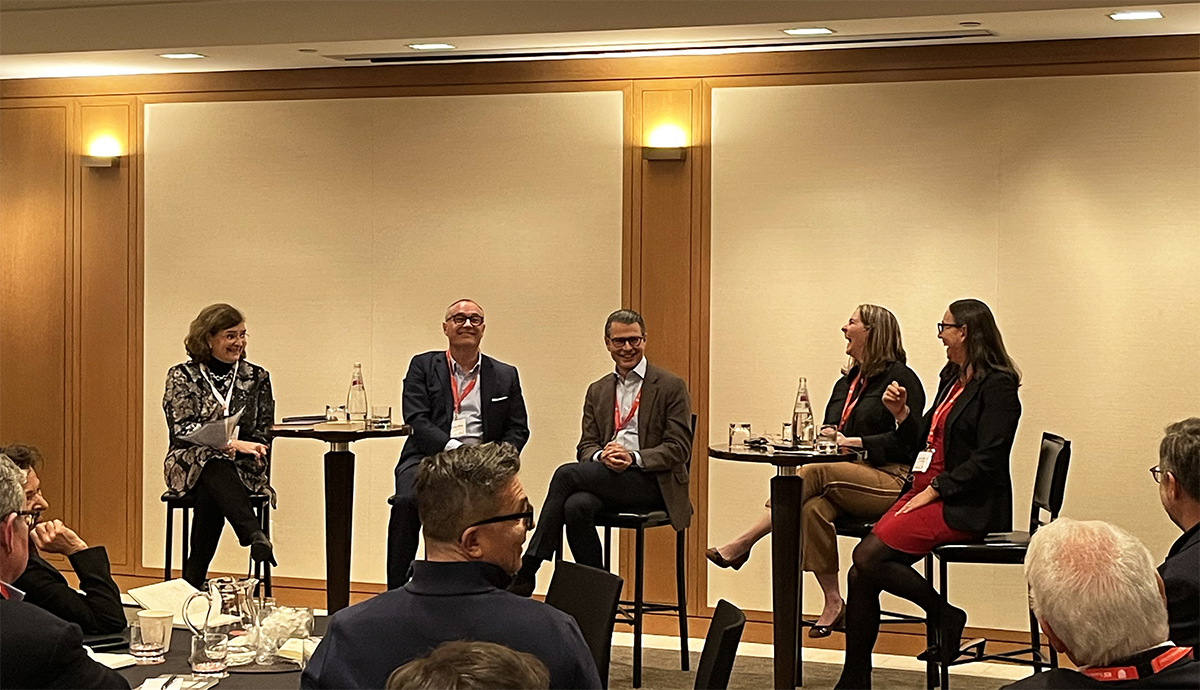“Super exciting and super head exploding” – this is how speakers at the IESE/Vivaldi event on March 1 characterized opportunities around Business Reinvention.
Kip Meyer, Managing Director, Custom Partnerships at IESE welcomed a packed room of executives at IESE Business School in New York City, inviting them to, “turn off your certainty, turn on your curiosity.”
The event had a unique three-part format: an introduction setting the context for the discussion, a moderated panel of global business leaders, and interactive small group conversations that enabled the participants to explore the implications of business reinvention, facilitated by Professor Mike Rosenberg.
Vivaldi founder and CEO, Erich Joachimsthaler, PhD, opened the door for curiosity with the introduction, highlighting a recent AlixPartners survey of 3,000 CEOs that found 98% saying they need to overhaul their business model within the next three years, but most did not know where to get started. Joachimsthaler also explained the differences between digital transformation and real business reinvention – it is about reinventing the core, not just leveraging technology but also reinventing the entire business model and even the leadership approach.
The expert panel included Krishan Bhatia, President & Chief Business Officer, NBCUniversal; Tara Bustamante, Group SVP, Business Transformation, Warner Bros. Discovery; and Andreas Fibig, former Chairman and CEO of IFF and former President & Chairman of the Board of Management of Bayer Pharmaceutical.

Over the next 90 minutes, some of the thorniest questions facing businesses today were presented by moderators Julia Prats, IESE Professor, and Anne Olderog, Vivaldi Senior Partner.
- How do you know it is time to reinvent you core and what does this imply?
- When do you integrate new technology?
- How do you navigate a changing business model?
- What are the implications for leadership?
The discussion spanned these 4 key areas:
Redefining The Core
Industry Boundaries Are Shifting
In times of disruption, industry boundaries are not what they used to be. Krishan Bhatia spoke about the example of how we’re seeing increasingly interactive commerce functionality introduced into the media and gaming sectors, as consumers look for shopping experiences that are as simple and engaging as watching their favorite shows. At Warner Bros, the recent success of the game Hogwarts World demonstrated how media franchises can span traditional media and gaming.
Andreas Fibig spoke of entirely shifting industries during his leadership at IFF – from chemistry to biology, from producing ingredients to co-creating entire solutions.
The Core is Not What It Used to Be
While the core of the media industry has always been defined as content – as Tara Bustamante pointed out, the definition of what content is, evolves at the speed of light. Is it content enriched by data that shows its significance and impact? Is it metadata? Is it content co-created by and with consumers, such as on social media? Is it interaction and discussion around its impact? What trusted/quality content was yesterday may not be what it is in the future, as we are headed towards immersive, engaging, interactive content where audiences are invited to participate in various forms (and share data on their preferences in the process).
Similarly, Andreas Fibig spoke of his reinvention of IFF as a CEO – and the move from ingredients to full products that fit consumer needs. An example is the reinvention of animal protein with plant protein in order to supply protein needs of a growing world population – a need that require new textures, flavors and tastes, much beyond enzymes. This move allows the tackling of big, previously unsolved problems – such as world nutrition – and reinventing taste in the process.
Technology
What Comes First – Technology or Consumer Changes
In that age old debate, Krishan Bhatia’s position is that consumer changes force the reinvention – making business reinvention a must. With the growth of streaming alongside linear TV, the advertising model and technology around it is being reinvented, noted Bhatia, who tested the hypotheses that advertising is best when targeted and relevant. NBCU’s One Platform, which Bhatia leads, offers advertising models – and metrics – suited to both streaming and linear TV. He sees an evolution from one standard of measurement that has been the legacy currency for the TV industry to a multi-platform multi-currency measurement giving advertisers more choice. It’s also a far better fit to measure the complexity of how people are consuming content which is increasingly across multiple platforms.
For Tara Bustamante, media and technology cannot be viewed separately anymore – they are intrinsically liked together, especially as predictive analytics allow new consumer experiences to be created, from gaming to shopping or social interactions. As Bustamante said, media and technology are now intertwined — media operates in tandem with technology to create outstanding consumer experiences, supported by data that allows for precision targeting and personalized paths.
“We view everything through the lens of technology,” she shared.
Business Model
The Rise of Ecosystems As a Business Model
As the core is being redefined with support from technology and data, what we monetize today can be very different than yesterday. Yesterday’s model was monetizing content as an asset to be leveraged, in a traditional pipeline value chain model. Today, as Bhatia pointed out, media companies realize that their core asset is the understanding (through data) and relationship (through technology) with consumers. First, this requires a deep understanding of audiences and their preferences and desires on their own terms – rather than simply defining audiences by product preferences (e.g. Action lovers). Second, the foundation of the business model is no longer the transaction (i.e. selling to consumers media that they consume) but a series of interactions that engage consumers across the content they choose to be a part of their lives. These interactions can include gaming, in-media shopping (or InScene Advertising that NBCU has pioneered), content co-creation, etc.
Media companies have an opportunity to redefine themselves as managers/orchestrators of immersive content organized around key media franchises (or in business terms, Interaction Fields, as Erich Joachimsthaler would call these). For the first time, as Bustamante pointed out, media companies are thinking about how to monetize these relationships as opposed to benefit from on-off transactions.
Traditional Value Chains are Pulled Apart
These ecosystems require a broad cooperation from many players across the industry and outside to be effective, as no one player will have the required capabilities. All speakers spoke of collaboration with a wide network of start-ups and other industry players from across the ecosystem. Andreas Fibig spoke of co-creation with customers – a much different model from creating an ingredient and monetizing it by selling it to customers, in a traditional value chain model. The ecosystem model allows forces and capabilities to be pulled together from across the industry to solve big problems.
Leadership
Curiosity as Core Leadership Competence
Bhatia echoed the need for inquisitiveness – he actively recruits for curiosity as a core competence, since he sees it as a key success factor for leaders in today’s world of complex ecosystems. This makes experience in the industry less relevant than the ability to calculate backwards from the desired outcome. For the ecosystem economy, leaders can be those who can ask the right questions, since nobody has the definitive answers.
In closing the event, IESE Professor Mike Rosenberg drew a further distinction between transformation and business reinvention, rooted in radical shifts in technology and the world. To cope, an ecosystem approach may be called – to push industry boundaries, search for big answers to big questions – and ultimately reinvent your business.
Is Your Business Ready For The Future?
This event evolved from a unique partnership between Vivaldi Group, a global leader in business and brand transformation, and IESE Business School, a global leader in management education ranked #3 worldwide (2022 MBA rankings.) Following the success of the event, IESE Business School and Vivaldi plan to partner to host more events together in the future.

